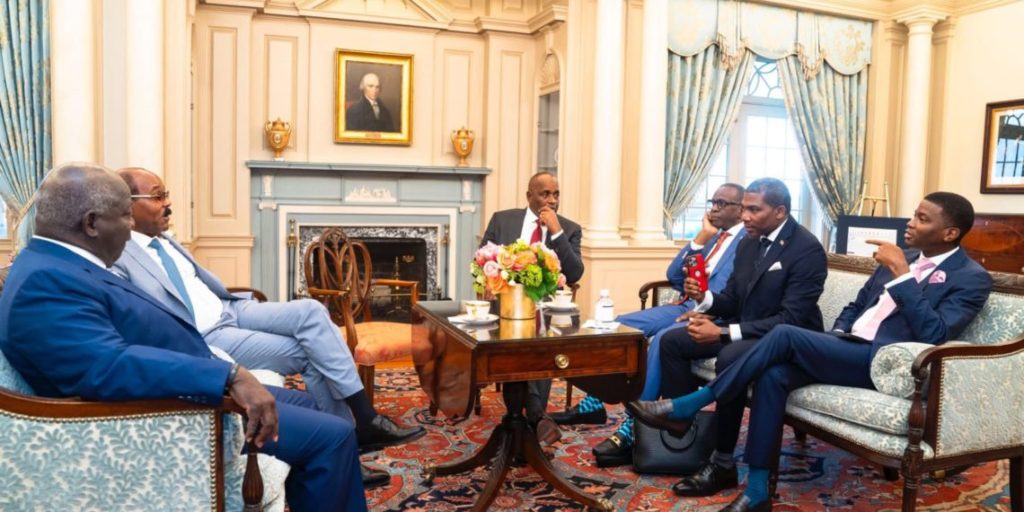Prime Minister Drew Advances Geothermal Energy Initiative in U.S.-OECS Regional Discussions
The first high-level meeting between U.S. Secretary of State Marco Rubio and the Heads of Government of the Organisation of Eastern Caribbean States (OECS) and The Bahamas marked a significant step towards reinvigorating U.S.-Caribbean relations. Held in Washington, D.C., the meeting served as a platform for comprehensive discussions encompassing a range of critical issues, including regional security, energy resilience, economic development, and migration. Secretary Rubio’s engagement underscored the U.S. Administration’s commitment to prioritizing sustained and respectful dialogue with Caribbean partners, acknowledging the strategic importance of the region to the United States and reaffirming shared values of democracy, security, and mutual prosperity.
Energy security emerged as a central theme during the discussions. Caribbean leaders articulated the urgent need to address high electricity costs, expand investments in renewable energy sources, and modernize critical infrastructure. Recognizing these concerns, Secretary Rubio expressed U.S. support for initiatives aimed at enhancing energy resilience while cautioning against excessive reliance on partnerships that could potentially create long-term vulnerabilities. Prime Minister of Saint Kitts and Nevis, Dr. Terrance Drew, highlighted his nation’s geothermal energy ambitions, presenting Saint Kitts and Nevis as a potential renewable energy hub for the subregion. He emphasized the crucial role of affordable, sustainable energy as a catalyst for economic transformation, job creation, and youth opportunity. Leveraging the geographical proximity of U.S. territories like Puerto Rico and the U.S. Virgin Islands, Dr. Drew called for a strengthened partnership with the United States, reflecting the Caribbean’s strategic position and the long-standing relationship with the U.S., both preceding and following the formal establishment of diplomatic ties.
The meeting also addressed pressing security concerns, focusing on transnational crime and border security. Both the U.S. and OECS Heads advocated for enhanced intelligence sharing and regional coordination to combat gun trafficking and disrupt organized criminal networks. Secretary Rubio reiterated the U.S. commitment to supporting multilateral efforts to restore stability in Haiti and highlighted ongoing U.S. humanitarian assistance to the region. This commitment reflects the U.S. recognition of the interconnectedness of security challenges within the Caribbean and the importance of collaborative action to address these threats effectively.
Caribbean leaders used the opportunity to advocate for closer cooperation on a range of other key issues, including climate resilience, food security, health security, migration protocols, and more equitable U.S. visa and repatriation policies. They stressed the importance of strengthening U.S. collaboration with regional institutions such as the OECS, the Regional Security System (RSS), and the Caribbean Disaster Emergency Management Agency (CDEMA). These calls for enhanced cooperation underscore the region’s desire for a more balanced and mutually beneficial partnership with the United States, one that recognizes the Caribbean’s unique vulnerabilities and development needs.
Secretary Rubio reaffirmed the U.S. commitment to providing foreign assistance aligned with local priorities, signifying a shift towards a more collaborative approach to development cooperation. This commitment reflects a recognition that effective assistance should be driven by the specific needs and priorities of recipient countries, fostering greater ownership and sustainability of development initiatives.
The meeting concluded with a shared commitment to fostering a forward-looking partnership that addresses both long-standing issues and emerging challenges across the Americas. This renewed focus on partnership reflects a mutual understanding of the interconnectedness of the region and the importance of collaborative action to promote stability, security, and prosperity. The discussions laid the groundwork for a more robust and dynamic U.S.-Caribbean relationship, built on mutual respect, shared interests, and a commitment to tackling the complex challenges facing the region. The emphasis on dialogue, cooperation, and shared responsibility signifies a positive step towards strengthening ties and addressing the diverse needs of the Caribbean.
Share this content:












Post Comment